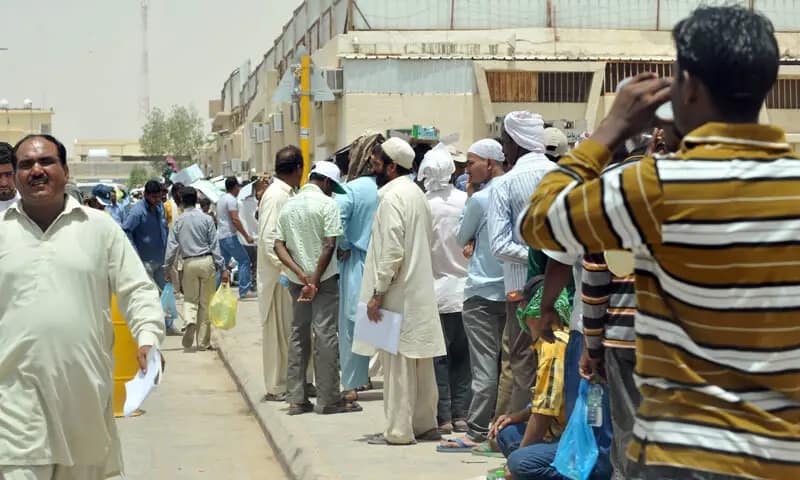
Tremors of 5.3-magnitude felt in twin cities, northern areas
October 21, 2025
PTI announces ‘massive public rally’ in Karachi to kick off nationwide public engagement campaign
October 22, 2025Saudi Arabia has banned employers from charging any fees to their domestic workers, including for recruitment and work permits, setting maximum penalties of a fine worth 20,000 riyals (SR) and a three-year ban on hiring, according to Saudi Gazette.
The Saudi outlet reported on Monday that employers were banned from “charging any fees from their domestic workers”, including those “related to recruitment, change of professions, transfer of services, residency permit (iqama) and work permits”.
Saudi Gazette said the provisions were included in the “Guide to the Rights and Obligations of Domestic Workers”, issued by the Saudi human resources ministry. It added that the new regulations “include a package of rights that guarantee the domestic worker a decent life and a stable work environment”.
According to a guide available on the Saudi human resources ministry’s website, professions/jobs permitted by law in the domestic worker sector include “domestic worker, private driver, educator, home nurse, home cook, home planning, home travel, home life, home manager, home guard, home farmer, home coffee-maker, personal assistant, and physical therapy specialist”.
The guidelines also allow the addition of any other profession that may be within household tasks.
The guide defines a domestic worker as any person “who performs domestic work or the like directly or indirectly for the domestic employer and any member of the staff under his supervision who performs domestic work or someone who takes his place”.
To deter violations, the regulations set a “financial fine that may reach up to SR20,000, in addition to the possibility of being banned from recruiting for a period of up to three years”.
The ban may be extended to become permanent in some cases, with the penalty doubled in case of repeated violation, the report added.
Meanwhile, the regulations also mandate domestic workers to ensure proper conduct, including taking care of the employer’s property, maintaining household secrets, respecting Islam and keeping societal values and morals in mind.
A domestic worker who violates the regulations will face a fine of up to SR2,000, or a permanent ban on working in Saudi Arabia, or both.
“Fines shall be multiplied by the number of violations proven against the domestic worker. The violating domestic worker shall bear the costs of his return to his home country,” the guide stated.
According to the Bureau of Emigration and Overseas Employment, over 2.05 million Pakistani workers, including those in the domestic sector, were registered for employment in Saudi Arabia from 2020 to September this year.
Rights of domestic workers
The new regulations also stipulate that “domestic workers shall be disbursed with their wages according to the unified contract signed with the employer,” Saudi Gazette reported.
Saudi Arabia has recorded minor violations of its strict labour regulations for decades, allowing an influx of cheap labour used both by companies and as domestic workers.
Yemen, Egypt, Lebanon, Ethiopia, India, Pakistan, Sri Lanka, Bangladesh, Indonesia and the Philippines all have large numbers of citizens working in the country and all rely heavily on their remittances.
According to Saudi Gazette, the new guidelines stress workers’ right to a weekly rest day agreed upon in the contract.
The provisions also include “daily rest hours of no less than eight continuous hours, in addition to a full month’s leave after completing two years of continuous work if the worker wishes to renew the work contract”.
Domestic workers also have the right to obtain a “travel ticket to his/her country every two years at the employer’s expense, an end-of-service gratuity equivalent to one month’s salary upon completing four consecutive years, and sick leave of up to 30 days per year when needed, based on an approved medical report”.
They also have the right to keep all their identification documents, such as their passport and iqama, with the employer not allowed to confiscate them.
Under the guidelines, as per Saudi Gazette, the employer is obligated to enable the worker to communicate with his family in a normal manner, issue and renew residency and legal licences at his own expense, and pay the monthly wage regularly as per the contract.
In 2008, the Human Rights Watch called on Saudi Arabia to improve labour law protections and end its “sponsorship” system to prevent domestic workers from being treated like slaves.
Under the “sponsorship” system, also known as the “kafala” system, foreigners in Saudi Arabia obtain a visa through their employer, who usually retains their passports, binding them to the recruiter.
In 2021, the kingdom amended the kafala system by allowing some migrant workers to leave the country without their employer’s permission.



